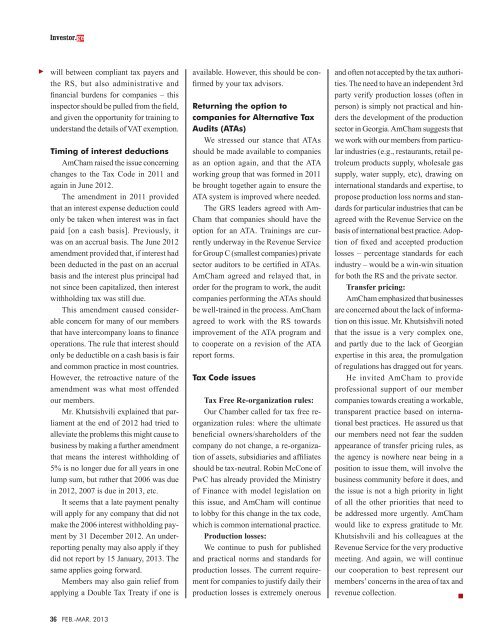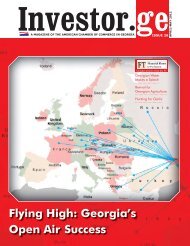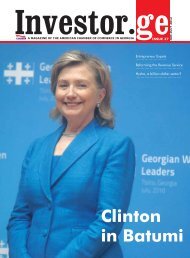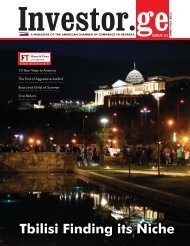Issue 1, 2013 February-March - Investor.ge
Issue 1, 2013 February-March - Investor.ge
Issue 1, 2013 February-March - Investor.ge
- No tags were found...
Create successful ePaper yourself
Turn your PDF publications into a flip-book with our unique Google optimized e-Paper software.
will between compliant tax payers andthe RS, but also administrative andfinancial burdens for companies – thisinspector should be pulled from the field,and given the opportunity for training tounderstand the details of VAT exemption.AmCham raised the issue concerningchan<strong>ge</strong>s to the Tax Code in 2011 andagain in June 2012.The amendment in 2011 providedthat an interest expense deduction couldonly be taken when interest was in factpaid [on a cash basis]. Previously, itwas on an accrual basis. The June 2012amendment provided that, if interest hadbeen deducted in the past on an accrualbasis and the interest plus principal hadnot since been capitalized, then interestwithholding tax was still due.This amendment caused considerableconcern for many of our membersthat have intercompany loans to financeoperations. The rule that interest shouldonly be deductible on a cash basis is fairand common practice in most countries.However, the retroactive nature of theamendment was what most offendedour members.Mr. Khutsishvili explained that parliamentat the end of 2012 had tried toalleviate the problems this might cause tobusiness by making a further amendmentthat means the interest withholding of5% is no lon<strong>ge</strong>r due for all years in onelump sum, but rather that 2006 was duein 2012, 2007 is due in <strong>2013</strong>, etc.It seems that a late payment penaltywill apply for any company that did notmake the 2006 interest withholding paymentby 31 December 2012. An underreportingpenalty may also apply if theydid not report by 15 January, <strong>2013</strong>. Thesame applies going forward.Members may also gain relief fromapplying a Double Tax Treaty if one isavailable. However, this should be confirmedby your tax advisors.We stressed our stance that ATAsshould be made available to companiesas an option again, and that the ATAworking group that was formed in 2011be brought to<strong>ge</strong>ther again to ensure theATA system is improved where needed.The GRS leaders agreed with Am-Cham that companies should have theoption for an ATA. Trainings are currentlyunderway in the Revenue Servicefor Group C (smallest companies) privatesector auditors to be certified in ATAs.AmCham agreed and relayed that, inorder for the program to work, the auditcompanies performing the ATAs shouldbe well-trained in the process. AmChamagreed to work with the RS towardsimprovement of the ATA program andto cooperate on a revision of the ATAreport forms.Our Chamber called for tax free reorganizationrules: where the ultimatebeneficial owners/shareholders of thecompany do not chan<strong>ge</strong>, a re-organizationof assets, subsidiaries and affiliatesshould be tax-neutral. Robin McCone ofPwC has already provided the Ministryof Finance with model legislation onthis issue, and AmCham will continueto lobby for this chan<strong>ge</strong> in the tax code,which is common international practice.We continue to push for publishedand practical norms and standards forproduction losses. The current requirementfor companies to justify daily theirproduction losses is extremely onerousand often not accepted by the tax authorities.The need to have an independent 3rdparty verify production losses (often inperson) is simply not practical and hindersthe development of the productionsector in Georgia. AmCham sug<strong>ge</strong>sts thatwe work with our members from particularindustries (e.g., restaurants, retail petroleumproducts supply, wholesale gassupply, water supply, etc), drawing oninternational standards and expertise, topropose production loss norms and standardsfor particular industries that can beagreed with the Revenue Service on thebasis of international best practice. Adoptionof fixed and accepted productionlosses – percenta<strong>ge</strong> standards for eachindustry – would be a win-win situationfor both the RS and the private sector.AmCham emphasized that businessesare concerned about the lack of informationon this issue. Mr. Khutsishvili notedthat the issue is a very complex one,and partly due to the lack of Georgianexpertise in this area, the promulgationof regulations has drag<strong>ge</strong>d out for years.He invited AmCham to provideprofessional support of our membercompanies towards creating a workable,transparent practice based on internationalbest practices. He assured us thatour members need not fear the suddenappearance of transfer pricing rules, asthe a<strong>ge</strong>ncy is nowhere near being in aposition to issue them, will involve thebusiness community before it does, andthe issue is not a high priority in lightof all the other priorities that need tobe addressed more ur<strong>ge</strong>ntly. AmChamwould like to express gratitude to Mr.Khutsishvili and his colleagues at theRevenue Service for the very productivemeeting. And again, we will continueour cooperation to best represent ourmembers’ concerns in the area of tax andrevenue collection.







